-
Get Cloud GPU Server - Register Now!
Toggle navigation

Most businesses highly doubt the efficacy of Search Engine Optimization (SEO) in getting conversions and generating revenue. After all, unlike Pay-Per-Click (PPC), SEO doesn’t produce instantaneous overnight results, which puts off businesses because they cannot ‘see’ the results.
There are certain tools to test how much progress a website has made with SEO, however, most of those tend to bludgeon pockets, particularly for small and medium-sized businesses as they scramble to find cost-effective services such as internet by AT&T service.
Thankfully, there are some free options in the market as well such as Google Analytics. Google Analytics is one of the free tools that allow you to measure your SEO and web metrics. It is indubitably a rigorous and effective analytical tool that most small businesses wouldn’t require any other measurement tool to gauge the value of their SEO efforts for their business.
Read on below to understand how to use Analytics to measure and improve your SEO.
Organic search traffic comes from users who find you on the search engine result page (SERP) when they type in a keyword. This doesn’t include paid traffic, which comes via paid search engine ad.
To look up your organic traffic, go to the Channels report in Analytics. Channels show you varying ways users come across your website e.g. social, referral, paid search, affiliates, directors, or organic search. This report reveals how each channel is faring with regards to traffic, its behavior, and conversions.
Just go to Acquisition 🡺 All Traffic 🡺 Channels.
Then click on Organic Search in the default channel grouping column, here you can crack down on your organic traffic. You can even see a list of your top-performing organic keywords and sort them by different metrics such as the bounce rate, which helps you deduce low-performing keywords.
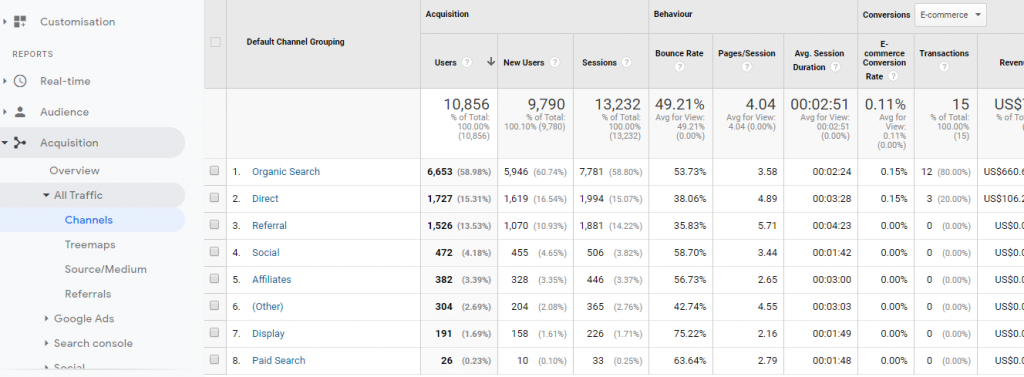
You may also view how much of your organic search traffic is coming from each source i.e. different search engines. Just go to Acquisition 🡺 All Traffic 🡺 Channels 🡺 Source (Primary Dimension tab above the report)
See Landing Pages for Organic Search
You may also check which landing page of your website is summoning the most organic traffic. Just click on the Landing page in the Primary Dimension tab.
To assess your organic traffic along with other reports, create a default segment of your Organic Traffic. Just Click on +Add Segment on top of the report, and choose a segment from the list.
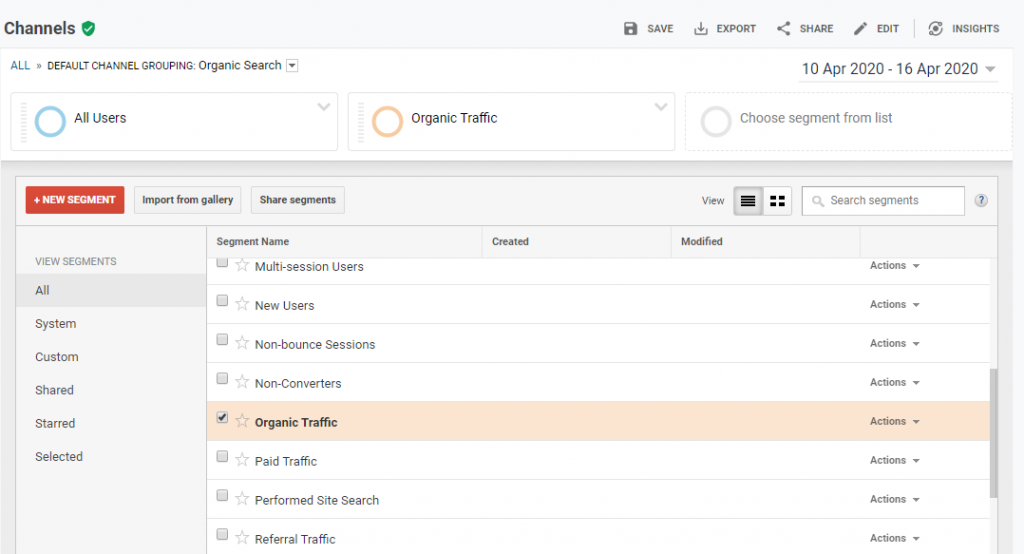
One of the top SEO goals is to acquire the most traffic for your site, but does that traffic holds any value to your business, is it bringing in any revenue? Different channels bring in varying levels of traffic and value to your SEO as each channel plays a hand in converting your visitor.
Most businesses tend to underestimate the value of certain channels such as organic search traffic and credit the conversions to paid traffic by judging with the last-click attribution model.
To understand how each channel is contributing to customers’ journeys and appropriately gauge the value of each channel, use the Multi-Channel Funnels report in Analytics, particularly the Assisted Conversions report. Just go to Conversions 🡺 Multi-channel Funnels 🡺 Assisted Conversions.
The report lets you glimpse at which channel appeared in the customer’s conversion journey, but wasn’t the last click conversion.
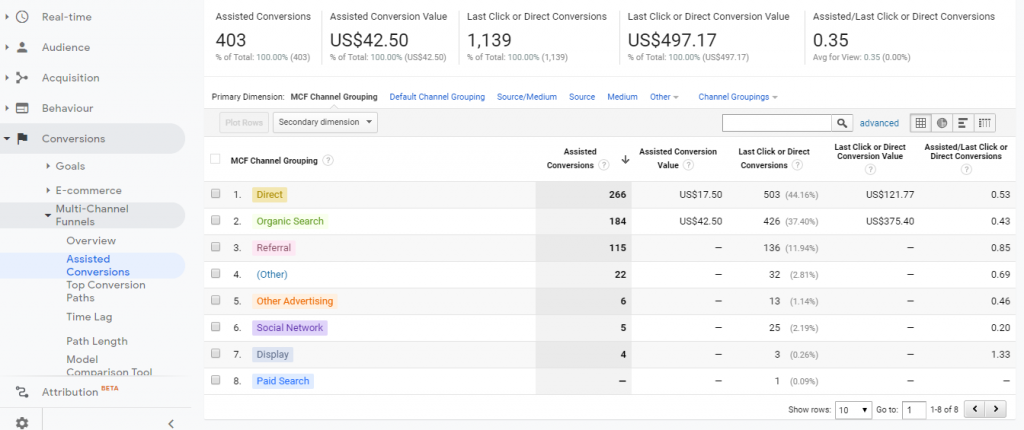
In the screenshot of Google’s Demo account, Direct has the highest number of Assisted Conversions. The numbers may vary as per your website traffic behavior. If the channel has the greatest number of assisted conversions, but less number of Last Click Conversions, it means the channel is valuable but is underestimated.
Click on each channel to compare the business’s Assisted Conversion value with its last click Conversion value. It may clear the air over which channel has had a higher contribution to conversions.
Google has always emphasized on page load speeds as it greatly influences user experience. But most businesses tend to underestimate their role and instead focus on keyword and other SEO strategies to get their website ranked.
Google’s algorithm wants you to focus on user experience, and hence employs page speed as a major ranking factor. Pay heed to it and your rankings will rise automatically, and will subsequently lead to increased conversions.
So it’s imperative that you measure which of your website pages are slow and how they are negatively affecting your conversions.
Go to Behavior 🡺 Site Speed 🡺 Page Timings. In the drop-down option of the middle column, choose Avg. Page Load Time (sec), and set the third column to % Exit.
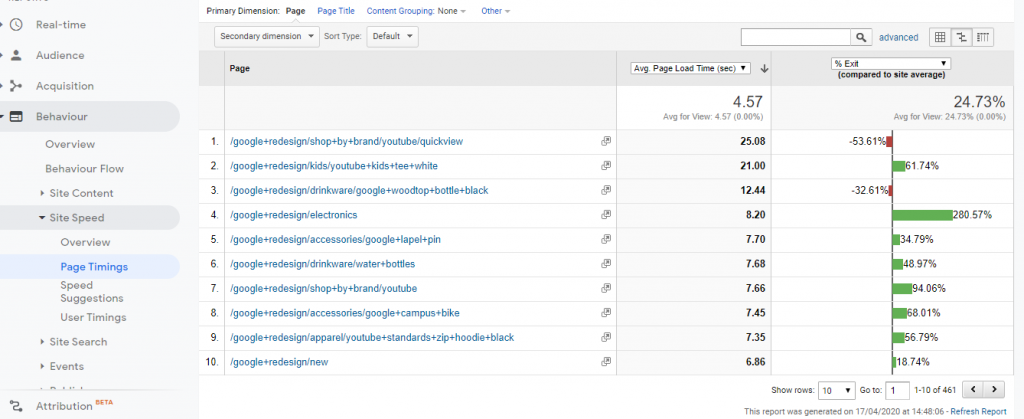
The report clearly shows for each page, the higher the page load time, the quicker the visitors exit the page. And the lower the page load time, the longer the visitors tend to stay on that page.
You may also add a secondary dimension for Medium, and check % Exit each channel traffic.
Therefore, it’s essential to optimize the load time for each of the pages with slow speeds. After improving the load time, you can compare the previous and current reports to showcase how page speed optimization has helped spur traffic and higher conversion as well.
In the SEO game, high-quality and SEO-optimized site content is the key to being the winner. However, you need to regularly assess and update content on your top-performing pages to stay relevant and continue ranking.
Navigate to Behavior 🡺 Site Content 🡺 Landing Pages (along with other options under Site Content)
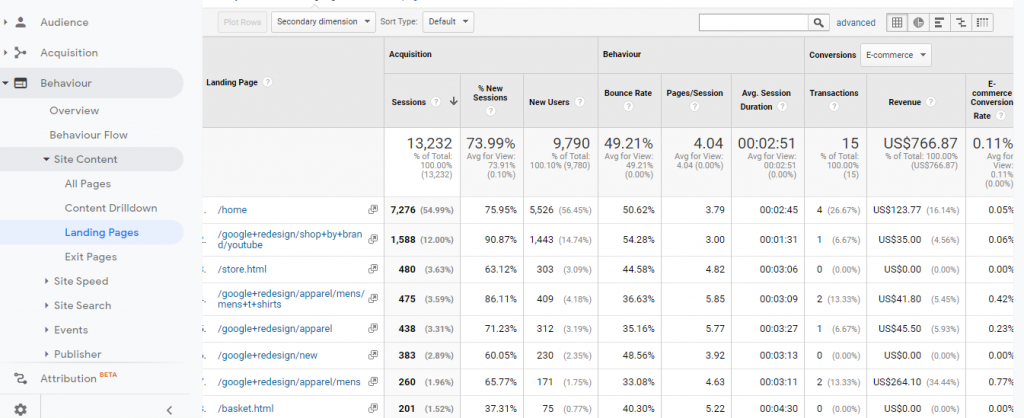
These reports highlight a number of things e.g. which page gets more traffic but has little to no value. So you may delve into how you can increase the value of that page. Does it require a content upgrade, better CTA, and anything else that can add to its value and spur traffic and conversions? Check for pages that previously had higher traffic, but now it has decreased. Scrutinize the reason for the drop and assess any upgrade potential for those pages.
With Content Drilldown reports, see which blog posts have higher traffic, which may help you see how you can add more value to the blog post with FAQs, up-to-date facts, and the lead magnets, and see what sort of content your audience is looking for and you may add similar topics on the blog.
Furthermore, you can assess dwell time, page views, and even check which internal link visitors tend to click. This sort of scrutiny helps you identify how your site content is performing, and how you can improve it.
SEO experts want to know, which keyword is bringing in traffic to their site. While Google Analytics may not be an as effective and all-encompassing tool in helping you assess the success of your keywords as one cannot analyze the keyword in conjunction with their behavior.
But if premium SEO tool such as Keyword Hero is not the option, then you can get by with Analytics by combining it with the Search Console. Navigate to Acquisition 🡺 Search Console 🡺 Landing Pages in Google Analytics. This will display which landing page visitors come across when using the keywords to find you.
SEO is an ongoing process; it requires constant efforts and assessment to acquire the desired results. While it may take time with SEO, but it’s absolutely worth it in the end. To get the best out of your SEO endeavors, keep an eye on metrics and improve where they are lagging and to do that Google Analytics is a perfect tool as any.
Author-

Baldwin Jackson is a successful digital marketer with expertise in search engine optimization and content marketing. The perfect balance of his analytical ability and creative thinking is what sets him apart from other practitioners in the digital marketing realm. He has helped a lot of small and medium-sized businesses in crafting their digital marketing strategies that are not only cost-effective but delivers results as well.
Baldwin is also a proud father of two kids and a Sports enthusiast. When he is not working, you will find him watching ESPN and NFL network. He has been able to get an amazing package on his favorite channels from Buytvinternetphone.com.